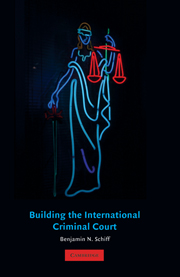Book contents
- Frontmatter
- Contents
- Preface
- Acronyms
- Building the International Criminal Court
- Introduction
- 1 River of Justice
- 2 Learning from the Yugoslavia and Rwanda Tribunals
- 3 The Statute – Justice versus Sovereignty
- 4 Building the Court
- 5 NGOs – Advocates, Assets, Critics, and Goads
- 6 ICC–State Relations
- 7 The First Situations
- 8 Conclusions: The Politics of the International Criminal Court
- Web Sites for Further and Ongoing Information
- Bibliography and Sources
- Index
5 - NGOs – Advocates, Assets, Critics, and Goads
Published online by Cambridge University Press: 05 September 2012
- Frontmatter
- Contents
- Preface
- Acronyms
- Building the International Criminal Court
- Introduction
- 1 River of Justice
- 2 Learning from the Yugoslavia and Rwanda Tribunals
- 3 The Statute – Justice versus Sovereignty
- 4 Building the Court
- 5 NGOs – Advocates, Assets, Critics, and Goads
- 6 ICC–State Relations
- 7 The First Situations
- 8 Conclusions: The Politics of the International Criminal Court
- Web Sites for Further and Ongoing Information
- Bibliography and Sources
- Index
Summary
Nongovernmental organizations cajoled, lobbied, and in myriad ways pushed hard for the birth of the International Criminal Court, and now they are nurturing it, criticizing it, and sometimes acting as the Court's surrogates or agents, extending its reach. At once the ICC's most vigorous champions and its most demanding taskmasters, NGOs closely monitor the organization's declarations and actions. They do not speak to the ICC with one voice because they pursue a range of objectives. However, through the NGO Coalition for the International Criminal Court (CICC), they coordinate with each other on the objectives they share. From the Statute Conference onward, the relationship between the ICC and the NGOs has probably been closer, more consistent, and more vital to the Court than have analogous relations between NGOs and any other international organization.
By mid-2006 the CICC claimed more than 2,000 member organizations worldwide, ranging from major international NGOs such as Human Rights Watch (HRW) and Amnesty International (AI) to local peace and justice organizations. Many of the NGOs with which the Court interacts are members of the CICC. Some are closely affiliated with governments, such as the International Criminal Law Network, founded and largely funded by The Hague municipality and the Dutch Ministries of Defense and Foreign Affairs. Some are themselves federations, such as the International Federation of Human Rights Leagues (FIDH). Although the NGOs seek to shape the actions of the Court, the Court must manage the pressures exerted by the NGOs.
- Type
- Chapter
- Information
- Building the International Criminal Court , pp. 144 - 164Publisher: Cambridge University PressPrint publication year: 2008



